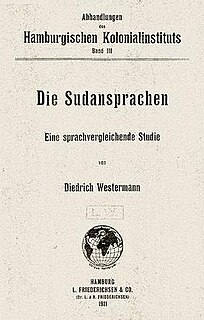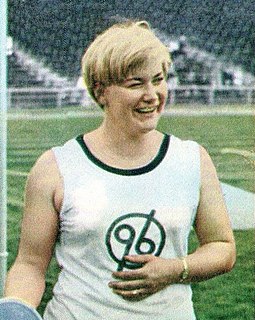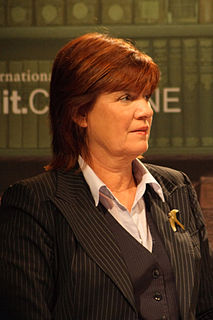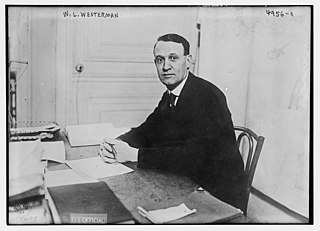See also
| This disambiguation page lists articles associated with the title Westermann. If an internal link led you here, you may wish to change the link to point directly to the intended article. |
Westermann may refer to:
| This disambiguation page lists articles associated with the title Westermann. If an internal link led you here, you may wish to change the link to point directly to the intended article. |

Diedrich Hermann Westermann was a German missionary, Africanist, and linguist. He substantially extended and revised the work of Carl Meinhof, his teacher, although he rejected some of Meinhof's theories only implicitly. Westermann is seen as one of the founders of modern African linguistics.
Westermann is a surname meaning "man from the West". Notable people with the surname include:

Sulingen is a town in the district of Diepholz, Lower Saxony, Germany. It is situated approximatively 30 km east of Diepholz, and 45 km south of Bremen.
Claus Westermann was a German Protestant Old Testament scholar. He taught at the University of Heidelberg from 1958 to 1978.

Lieselotte "Liesel" Westermann-Krieg is a retired German discus thrower. She held the world record from 5 November 1967 to 12 August 1971, with a two-months break in 1968. She competed for West Germany at the 1968 and 1972 Olympics and finished in second and fifth place, respectively. She won silver medals at the 1966 and 1971 European championships. For her athletics achievements Westermann was selected as the German Sportspersonality of the year in 1967 and 1969, and inducted into the Germany's Sports Hall of Fame in 2011.

Heiko Westermann is a former German footballer who played as a central defender.

H. C. Westermann was a highly influential and important American sculptor and printmaker whose art constituted a scathing commentary on militarism and materialism. His sculptures frequently incorporated traditional carpentry and marquetry techniques. From the late 1950s until his death in 1981, Westermann worked with a number of materials and formal devices to address a range of personal, literary, artistic, and pop-cultural references. The artist's sculptural oeuvre is distinguished by its intricate craftsmanship, in which wood, metal, glass, and other materials are laboriously hand-tooled, and by its ability to convey an offbeat, often humorous, individualistic sensibility.
Westermann Verlag is a German publishing firm, founded in the 19th century in Braunschweig, Duchy of Brunswick by George Westermann. Several other generations of the Westermann family succeeded him.
Archiv für das Studium der neueren Sprachen und Literaturen is the oldest modern philological journal, founded in 1846 by Ludwig Herrig and Heinrich Viehoff. The first two volumes were published by Julius Bädeker Verlag Elberfeld and Iserlohn and for the next 120 years by Georg Westermann Verlag Braunschweig. Since 1979, the journal is published by Erich Schmidt Verlag, Berlin. The articles, smaller contributions and reviews are written in German, English, and Romance languages. The current editor-in-chief is Christa Jansohn.
Hans Westermann was a German Communist, politician and fighter in the German Resistance against the Third Reich. He died in Nazi custody days after being arrested by the Gestapo.

Léo Joseph Paul Westermann is a French professional basketball player for Fenerbahçe of the Turkish Basketball League and the EuroLeague. Standing at 1.98 m, he plays at the point guard position. He also represents the senior French national basketball team.

Christine Westermann is a German television and radio host, journalist and author.

The Battle of Isefjord was a clash that occurred when the coastal defence ship HDMS Niels Juel was attacked by German forces as she tried to escape to neutral Sweden.

William Linn Westermann was an American historian and papyrologist who served as the president of the American Historical Association in 1944. He was regarded as an expert on the economy of the ancient world.
The Police Regiment Centre was a formation of the Order Police during the Nazi era. During Operation Barbarossa, it was subordinated to the Schutzstaffel (SS) and deployed in German-occupied areas, specifically the Army Group Centre Rear Area, of the Soviet Union. In mid-1942, its three constituent battalions were reassigned and the unit was re-designated as the 13th Police Regiment.
The Police Regiment South was a formation of the German Order Police, the German national uniformed police force, during the Nazi era. During Operation Barbarossa, it was subordinated to the Schutzstaffel (SS) and deployed in German-occupied territories, specifically the Army Group South Rear Area. In July 1942, its three constituent battalions were redesignated as the 10th Police Regiment.
The Police Battalion 307 was a formation of the Order Police during the Nazi era. During Operation Barbarossa, it was subordinated to the SS and deployed in German-occupied areas, specifically the Army Group Centre Rear Area, of the Soviet Union, as part of Police Regiment Centre. Alongside detachments from the Einsatzgruppen, it perpetrated mass murder in the Holocaust and was responsible for large-scale crimes against humanity targeting civilian populations. In mid-1942, the battalion was reassigned to the 23rd Police Regiment and operated in Belarus.
The Police Battalion 314 was a formation of the German Order Police during the Nazi era. During Operation Barbarossa, it was subordinated to the SS and deployed in German-occupied areas, specifically the Army Group Centre Rear Area, of the Soviet Union, as part of Police Regiment South. Alongside detachments from the Einsatzgruppen and the 1st SS Infantry Brigade, it perpetrated mass murder in the Holocaust and was responsible for large-scale crimes against humanity targeting civilian populations.
The Police Battalion 309 was a formation of the Order Police during the Nazi era. During Operation Barbarossa, it was subordinated to the German Army's 221st Security Division and deployed in German-occupied areas, specifically the Army Group Centre Rear Area, of the Soviet Union, as part of Wehrmacht's security forces. Alongside detachments from the Einsatzgruppen and the SS Cavalry Brigade, it perpetrated mass murders and was responsible for large-scale crimes against humanity targeting civilian populations.

The Order Police battalions were militarised formations of the German Order Police during the Nazi era. During World War II, they were subordinated to the SS and deployed in German-occupied areas, specifically the Army Group Rear Areas and territories under German civilian administration. Alongside detachments from the Einsatzgruppen and the Waffen-SS, these units perpetrated mass murder of the Jewish population and were responsible for large-scale crimes against humanity targeting civilian populations.